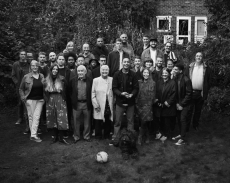
Email: reecejordan98@hotmail.co.uk
Total Article : 168
About Me:18-year-old sixth form student, studying English Literature, History and Government and Politics. My articles will broadly cover topics from the current affairs of politics to reviews of books and albums, as well as adding my own creative pieces, whether it be short fiction or general opinion.

Hip-hop has been brandished with a brush soaked in blood, golden shreds and cocaine residue. You need only look up American conservative news outlets to see that the mere mention of hip-hop springs to mind spouts of gang violence, profanity and low-hanging jeans. Even one of Carner’s prolific influences, Nas, whom he alludes to supporting in ‘Sun of Jean’, unapologetically raps about the struggles of gang life and drug dealing. The king of the scene right now (and perhaps of all time - time will tell), Kendrick Lamar, has released two of the most classic hip-hop albums within the same decade depicting the inextricable link between hip-hop, violence and gang affiliation.
Look closer to home and the likes of Skepta, Wiley and Stormzy cover similar themes revolving around London life.
Loyle Carner takes no such route, though. Instead he talks about ‘kinda missing’ his student loan and 'living in a student home', echoing the voice of UK’s youth of today, lumped with the unnecessary debt of tuition fees. This air of familiarity more grounded to home is where Carner shines most. He does not give us fantastical tales of struggles that appear so out of our own experience that they evaporate into abstractedness. Contrary to the growing grime scene uprooting out of London, Loyle Carner instead inclines to the other movement suffusing - rather than bombasting - around London – that of jazz. Carner has clearly taken influence from the likes of A Tribe Called Quest, Pharcyde and Mos Def: his sonorous sedated delivery complements beautifully with jazz chords and boom bap beats to create music that does not elicit an adrenalised skank, but more of a pensive head bop. He calls on his friend and colleague, Rebel Clef, to construct the instrumentals, which include great gospels epics in ‘Isle of Arran’ or a swagger-laden guitar riff like on ‘No CD’. Carner also calls on other London up and coming jazzy hip-hop extraordinaire, Tom Misch, for the track ‘Damselfy’, which see the two exhibit their chemistry that has stemmed from 2013.
One of the most glaring aspects of the album that is of particular importance is the moving sentimentality of Loyle Carner’s lyrics and subject matter. This shines most prominently when he talks about his family – the intimacy of Carner and his mum runs throughout the whole album, most notably in the interlude ‘Swear’, a voice recording of Loyle teasing her of his and her swearing. He also gives his mum a spoken-word minute or two on the subject of her son, a touching section of the album, which resonates of motherly love. Ironically, the most moving part of the album on Carner’s family is about his imaginary sister. On the track ‘Florence’, Carner conjures up a ‘freckled-faced fidgeter’ subject to his many tickles, an incessant talker, always waiting for the pleasure of Loyle’s pancakes that were mad just like his nan’s.
Coming out of a city that is oozing with – and salivating for – anger and energy, Loyle Carner offers us a different kind of narcotic, and appeals to the tenderness and fragility of out heartstrings.
Image Credits: stereoboard.com

0 Comment:
Be the first one to comment on this article.